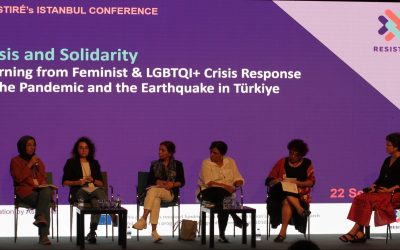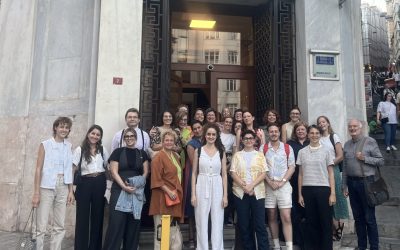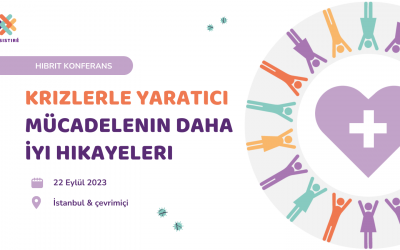We interviewed Sofia Strid, Senior Lecturer in Gender Studies at Örebro University (ORU) and scientific coordinator of RESISTIRÉ, to learn why it is important to focus specifically on gendered inequalities caused by COVID-19 policies.
COVID-19 has affected all types of population. Why focus specifically on gendered inequalities?
The simple answer is that gender is one of the most durable social, political and economic inequalities, and “all types of populations” are gendered: nobody is without gender – so gendered inequalities affect us all.
The slightly more complex answer is that the pandemic – like other crises – is gendered. The outbreak itself, the responses, and their secondary effects are gendered.
We know, for example, that while men make out a majority of the known covid-19 cases and run a higher risk of dying from covid-19 than women, women and girls are bearing the brunt of the secondary effects of the pandemic, including increasingly poor mental health, and the unintended effects of the policy responses, such as job-losses, a return to more traditional roles, and increased levels of gender-based violence.
These developments and impacts, like those of other crises, are gendered and related to sex, age, disability, ethnicity/race, migration status, religion, social class, and the intersections between these inequalities. They are also uneven and unequal, disproportional in their consequences for different groups, and their long-term impacts are uncertain. Policy responses to the pandemic need to consider an intersectional gender perspective, what we call gender+, and how some groups benefit, while others lose out. It is important to understand how different policy responses are having unequal and unequalising effects, but also how different responses can be put into place to understand and address gender and intersectional inequalities in different policy domains. RESISTIRÉ seeks to understand how to challenge and reduce the gendered inequalities of the responses and their unintended effects.
The even more complex answer is that analytically, gender is a fundamental societal, political and economic organising principle. It is an analytical central reference point, allowing for other analytical concepts to be located, and allowing for the analysis of how these intersect with gender. Gender can thereby help explain other systems of inequalities.
What is distinctive about the RESISTIRÉ project?
To me, RESISTIRÉ really stands out with its methodology, concept and consortium.
The methodology is based on a quick implementation in three co-creative cycles that start with researching the unintended effects of the policy and societal responses to the pandemic and culminate with the implementation and development of operational recommendations to mitigate these effects. The solutions are co-created with stakeholders in the Open Studios, a policy design tool based on the Helsinki Design Lab.
The concept is also distinctive. We understand gender as gender+, meaning that gender is always intersected by other inequalities such as age, dis/ability, ethnicity, gender identity, social class, and sexuality.
Finally, I think that the consortium itself is a main distinctive feature. We are a multi-disciplinary and multi-sectoral consortium of ten partners from nine European countries, with a network of 38 national experts covering 31 countries. It is a strong consortium, with partners’ complementary in-depth knowledge of mixed methods, inequality, intersectionality and gender, and we have a collaborative track record of translating research into policies. It means we are well equipped to tackle the challenges that lie ahead to complete the project.
What challenges do you foresee in its completion?
In addition to the pandemic itself, the rapidly changing environment is the major challenge. The political landscape is constantly evolving, and we observe a shifting, sometimes conflicting, implementation of COVID-19 policies with their effects on the economy, on health, on equality on fundamental rights – on all the domains of the European Commission’s gender equality strategy. There might be lack of scientific evidence on these rapid changes, and this could affect the project’s outcomes.
What outcomes do you hope to achieve through RESISTIRÉ?
We want to make a real difference and have a positive impact on policies that affect peoples’ lives. We are really aiming to reduce, or at least contribute to the reduction of, gendered and intersectional inequalities arising from COVID-19 policies, and to redress them. The key to achieving this outcome is to make the effects of the outbreak and its policy responses’ on inequalities visible, making the voices of vulnerable people heard, and to empower policymakers to take measures that alleviate the adverse effects that these people are experiencing.
We are also aiming to contribute to setting both current and future political and research priorities, by developing new concepts of bottom-up initiatives that have positive impacts on inequalities, and by developing new concepts to advance feminist theory beyond state-of-the-art, for example via the combination of science and technology studies, intersectionality theory, health inequality theory, humanities and Artificial Intelligence.
While this is certainly a time of great change and challenges, it is also a time of opportunity to be ambitious and design innovative solutions to respond to the outbreak through co-created and inclusive strategies that address old and new, durable and temporary, inequality patterns in and across policy domains. This, however, requires research that informs responses designed through inclusive innovation and experimentation, leveraging the skills and knowledge of the many, including through new technologies. It needs to be underpinned by an ethos of sustainability, that is, not only striving for economic recovery, but also working towards a profound transformation that provides just and ethical social and environmental recoveries for all.



